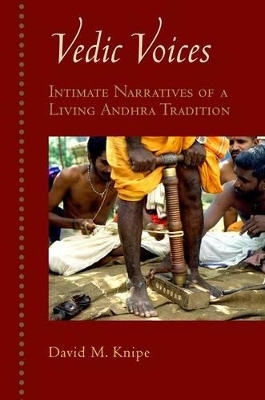
Vedic Voices
Intimate Narratives of Living Andhra Traditions
Seiten
2015
Oxford University Press Inc (Verlag)
978-0-19-939768-6 (ISBN)
Oxford University Press Inc (Verlag)
978-0-19-939768-6 (ISBN)
David M. Knipe studies four generations of ten families living in the Godavari Delta of coastal Andhra Pradesh, examining their lives; ancestral lineages; choices as pandits; relationships to wives and children; and ways of coping with an avalanche of changes in modern India.
For countless generations families have lived in isolated communities in the Godavari Delta of coastal Andhra Pradesh, learning and reciting their legacy of Vedas, performing daily offerings and occasional sacrifices. They are the virtually unrecognized survivors of a 3,700-year-old heritage, the last in India who perform the ancient animal and soma sacrifices according to Vedic tradition.
In Vedic Voices, David M. Knipe offers for the first time, an opportunity for them to speak about their lives, ancestral lineages, personal choices as pandits, wives, children, and ways of coping with an avalanche of changes in modern India. He presents a study of four generations of ten families, from those born at the outset of the twentieth century down to their great-grandsons who are just beginning, at the age of seven, the task of memorizing their Veda, the Taittiriya Samhita, a feat that will require eight to twelve years of daily recitations. After successful examinations these young men will reside with the Veda family girls they married as children years before, take their places in the oral transmission of a three-thousand-year Vedic heritage, teach the Taittiriya collection of texts to their own sons, and undertake with their wives the major and minor sacrifices performed by their ancestors for some three millennia.
Coastal Andhra, famed for bountiful rice and coconut plantations, has received scant attention from historians of religion and anthropologists despite a wealth of cultural traditions. Vedic Voices describes in captivating prose the geography, cultural history, pilgrimage traditions, and celebrated persons of the region. Here unfolds a remarkable story of Vedic pandits and their wives, one scarcely known in India and not at all to the outside world.
For countless generations families have lived in isolated communities in the Godavari Delta of coastal Andhra Pradesh, learning and reciting their legacy of Vedas, performing daily offerings and occasional sacrifices. They are the virtually unrecognized survivors of a 3,700-year-old heritage, the last in India who perform the ancient animal and soma sacrifices according to Vedic tradition.
In Vedic Voices, David M. Knipe offers for the first time, an opportunity for them to speak about their lives, ancestral lineages, personal choices as pandits, wives, children, and ways of coping with an avalanche of changes in modern India. He presents a study of four generations of ten families, from those born at the outset of the twentieth century down to their great-grandsons who are just beginning, at the age of seven, the task of memorizing their Veda, the Taittiriya Samhita, a feat that will require eight to twelve years of daily recitations. After successful examinations these young men will reside with the Veda family girls they married as children years before, take their places in the oral transmission of a three-thousand-year Vedic heritage, teach the Taittiriya collection of texts to their own sons, and undertake with their wives the major and minor sacrifices performed by their ancestors for some three millennia.
Coastal Andhra, famed for bountiful rice and coconut plantations, has received scant attention from historians of religion and anthropologists despite a wealth of cultural traditions. Vedic Voices describes in captivating prose the geography, cultural history, pilgrimage traditions, and celebrated persons of the region. Here unfolds a remarkable story of Vedic pandits and their wives, one scarcely known in India and not at all to the outside world.
David M. Knipe is a historian of religions focusing on Hinduism and Vedic studies. He conducted field research in India from 1971 to the present. In 1974 he released Exploring the Religions of South Asia, his educational television series of 15 programs on Hinduism, Islam, Buddhism, Jainism, and Christianity in India. Since 1980 he has concentrated on field studies in the Godavari Delta of Andhra Pradesh.
Acknowledgments ; List of Tables, Maps, and Illustrations ; Preface ; 1) The Godavari Delta ; 2) Vedamlo, "Living in the Veda" ; 3) A Selection of Ahitagnis and Other Veda Pandits ; 4) Becoming a Veda ; 5) Becoming a Householder ; 6) Becoming Agni ; Epilogue: Becoming "Modern" ; Glossary ; Notes ; Bibliography ; Index
| Erscheint lt. Verlag | 11.6.2015 |
|---|---|
| Zusatzinfo | 12 color illus., 30 b/w illus. |
| Verlagsort | New York |
| Sprache | englisch |
| Maße | 231 x 157 mm |
| Gewicht | 712 g |
| Themenwelt | Geschichte ► Allgemeine Geschichte ► Zeitgeschichte |
| Geisteswissenschaften ► Geschichte ► Regional- / Ländergeschichte | |
| Geschichte ► Teilgebiete der Geschichte ► Religionsgeschichte | |
| Geisteswissenschaften ► Religion / Theologie ► Hinduismus | |
| ISBN-10 | 0-19-939768-6 / 0199397686 |
| ISBN-13 | 978-0-19-939768-6 / 9780199397686 |
| Zustand | Neuware |
| Haben Sie eine Frage zum Produkt? |
Mehr entdecken
aus dem Bereich
aus dem Bereich
Gewalt, Umwelt, Identität, Methode
Buch | Softcover (2024)
Spector Books OHG (Verlag)
36,00 €
wie Freud im Kollektiv verschwand
Buch | Hardcover (2024)
Klett-Cotta (Verlag)
25,00 €


